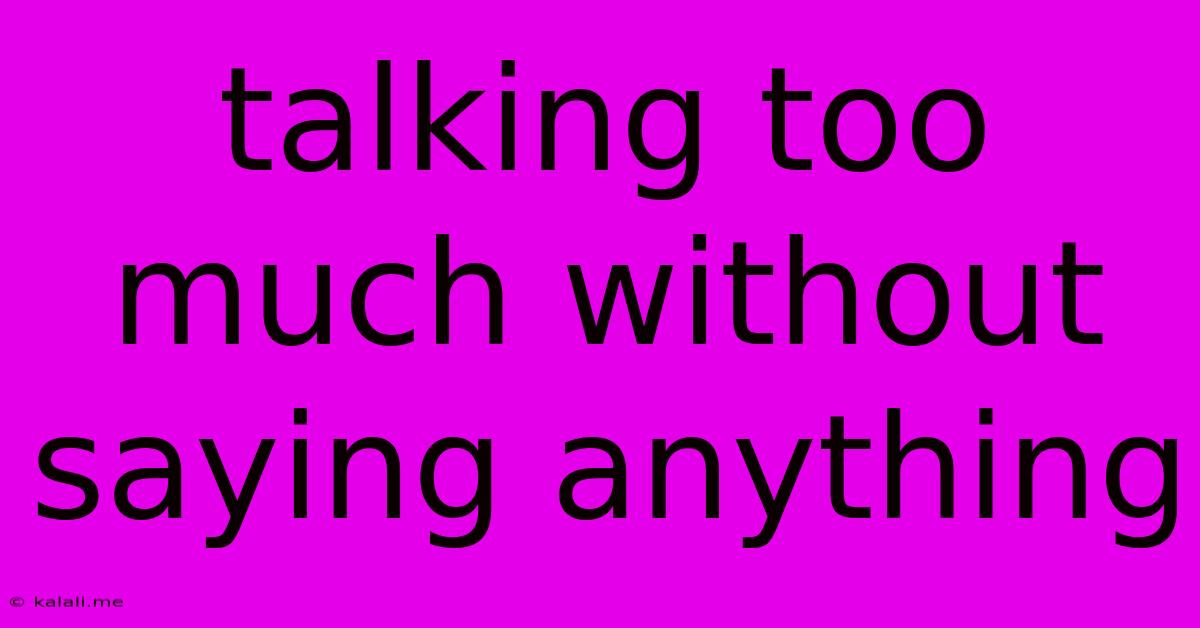Talking Too Much Without Saying Anything
Kalali
Jun 10, 2025 · 3 min read

Table of Contents
The Art of Saying Nothing: Why Too Much Talk Can Mean Too Little Substance
We've all encountered them: the individuals who can talk for hours, yet leave you feeling like they haven't actually said anything. This isn't necessarily about volume; it's about the lack of impactful communication. This article explores the phenomenon of excessive talking without conveying meaningful information, its causes, and how to avoid falling into this trap. It's about mastering the art of concise and impactful communication.
What is "Talking Too Much Without Saying Anything"?
This common communication flaw stems from a disconnect between the quantity of words spoken and the quality of the message delivered. It's characterized by rambling, digressions, repetition, and a lack of focus. Essentially, the speaker fills the air with sound, but the listener is left empty-handed, without any concrete takeaway or understanding. This can manifest in various forms, from lengthy, meandering anecdotes to overly detailed explanations of trivial matters. The core issue is a failure to effectively communicate a central idea or point.
Why Do People Talk Too Much Without Saying Anything?
Several factors contribute to this communication issue:
- Nerves and Anxiety: Some individuals overcompensate for nervousness by talking excessively, hoping to fill the silence and avoid awkward pauses.
- Lack of Confidence: Excessive talking can sometimes be a way to mask insecurity or a lack of confidence in one's ideas.
- Poor Communication Skills: Not everyone is naturally adept at structuring their thoughts and conveying them clearly and concisely.
- Habit and Personality: For some, excessive talking may simply be a ingrained habit or personality trait.
- Desire for Attention: In some cases, the sheer volume of words spoken serves as a way to seek attention or validation.
How to Avoid Talking Too Much Without Saying Anything:
Improving communication involves conscious effort and practice. Here's how to cultivate more effective and impactful conversations:
- Plan Your Message: Before speaking, consider your main point. What do you want your listener to take away from the conversation? Structure your thoughts around this central idea.
- Practice Active Listening: Truly listening to others helps you understand their perspective and tailor your response accordingly, preventing rambling and unnecessary tangents.
- Be Concise: Use clear and simple language, avoiding jargon or overly complex sentence structures. Get to the point quickly and efficiently.
- Be Mindful of Body Language: Nonverbal cues like eye contact and posture can signal engagement and confidence, helping to enhance your message.
- Pause and Reflect: Don't be afraid of silence. Pauses allow you to gather your thoughts and ensure your message is clear and coherent. They also give your listener time to process information.
- Seek Feedback: Ask trusted friends or colleagues for feedback on your communication style. Constructive criticism can help you identify areas for improvement.
The Power of Concise Communication:
In today's fast-paced world, effective communication is more crucial than ever. Mastering the art of saying more with fewer words isn't about being quiet; it's about being impactful. It's about respecting your listener's time and attention by delivering a clear, focused, and meaningful message. Learning to avoid excessive talking without saying anything is a valuable skill that enhances both personal and professional relationships. It's a skill worth cultivating.
Latest Posts
Latest Posts
-
How To Remove Ink Stains From Skin
Jun 11, 2025
-
How Much Does Wolverine Weight With Adamantium
Jun 11, 2025
-
That Looked A Little Bit Sharper Than Normal
Jun 11, 2025
-
The Walking Dead Season 2 Missable Trophies
Jun 11, 2025
-
Why Is Mol The Abbreviation To Mle
Jun 11, 2025
Related Post
Thank you for visiting our website which covers about Talking Too Much Without Saying Anything . We hope the information provided has been useful to you. Feel free to contact us if you have any questions or need further assistance. See you next time and don't miss to bookmark.